OUR
PUBLICATIONS
We’d love to discuss how we can apply our approach to improve the our and your community.

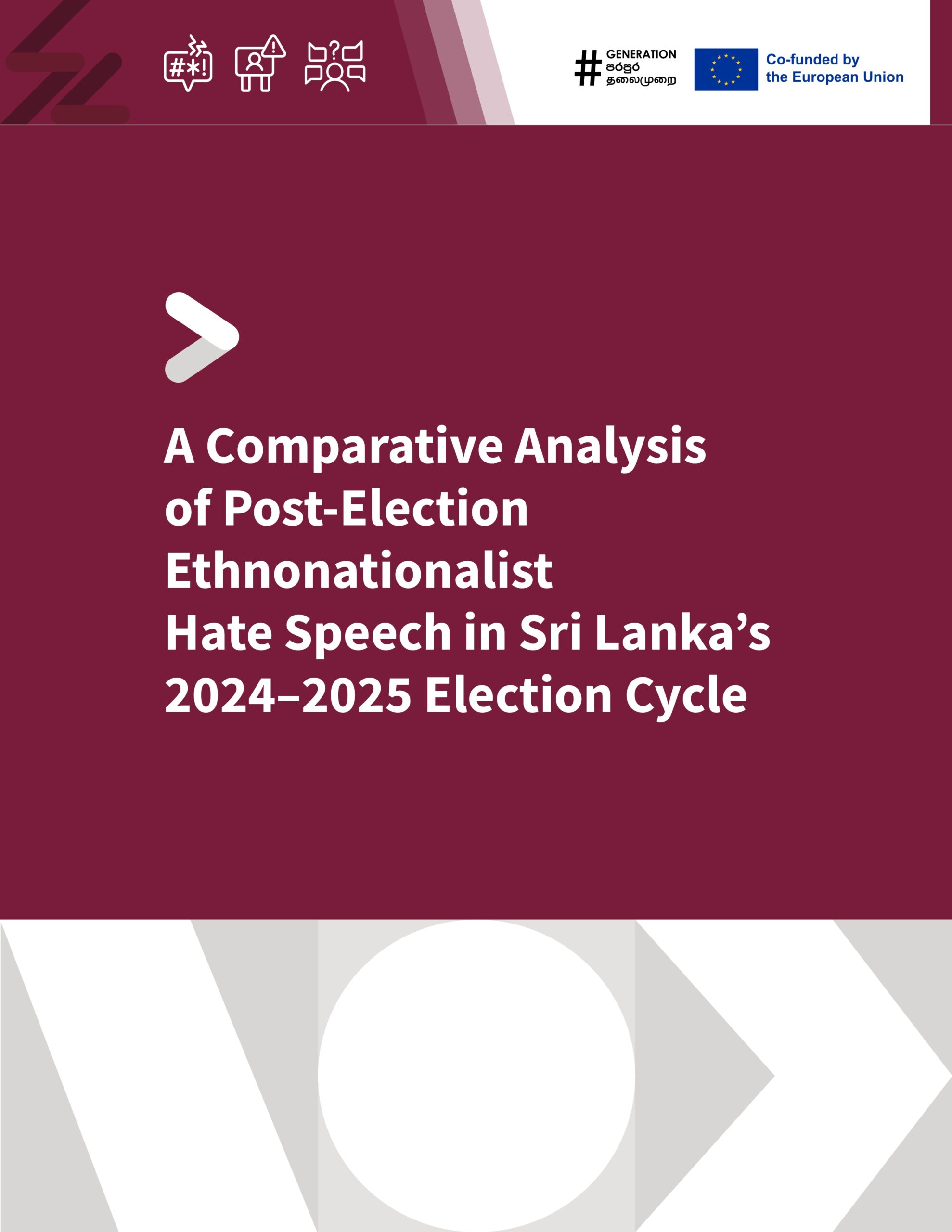
A Comparative Analysis of Post-Election Ethnonationalist Hate Speech in Sri Lanka’s 2024–2025 Election Cycle
This report examines patterns of ethnonationalist hate speech in Sri Lanka following the Presidential, Parliamentary, and Local Government Elections held between 2024 and 2025. It shows how election outcomes influenced the intensity and targets of divisive rhetoric, with minority communities repeatedly framed as disloyal or separatist depending on the political context. The findings highlight the cyclical nature of ethnonationalist narratives and their ongoing threat to social cohesion and democratic participation.
Post-Election Harmful Speech in Sri Lanka: Findings from the 2025 Local Government Elections
This report analyses coordinated disinformation, hate speech, and technology-facilitated gender based violence observed on major social media platforms following Sri Lanka’s 2025 Local Government Elections. It documents the rise of identity-based attacks, gendered and sexualised harassment targeting women politicians, and the use of forged documents, AI-generated media, and misleading news formats to spread false political narratives. The findings highlight how such content outpaced fact-checking efforts, deepened polarisation, and underscore the urgent need for stronger local-language moderation, platform–civil society collaboration, and targeted protections for those most affected.
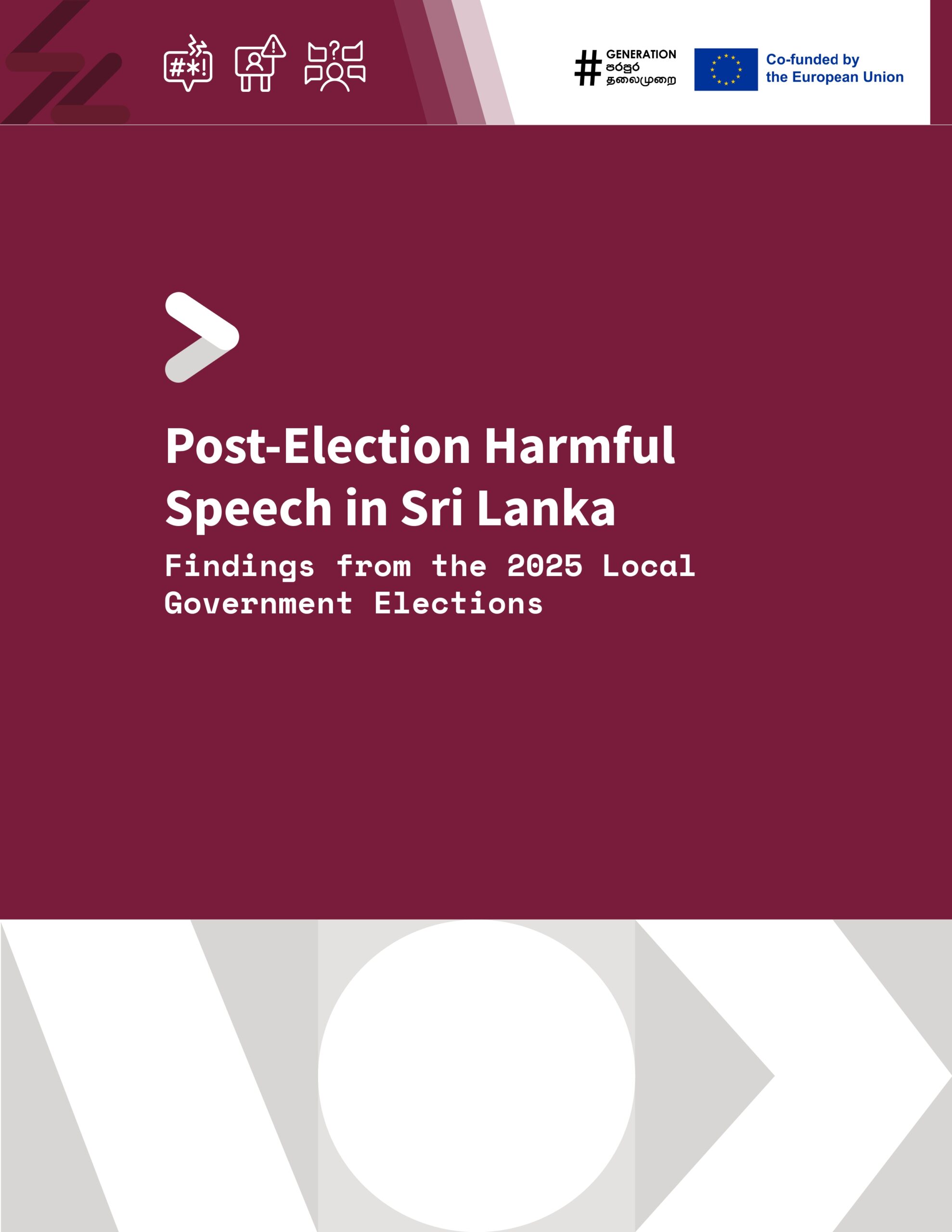
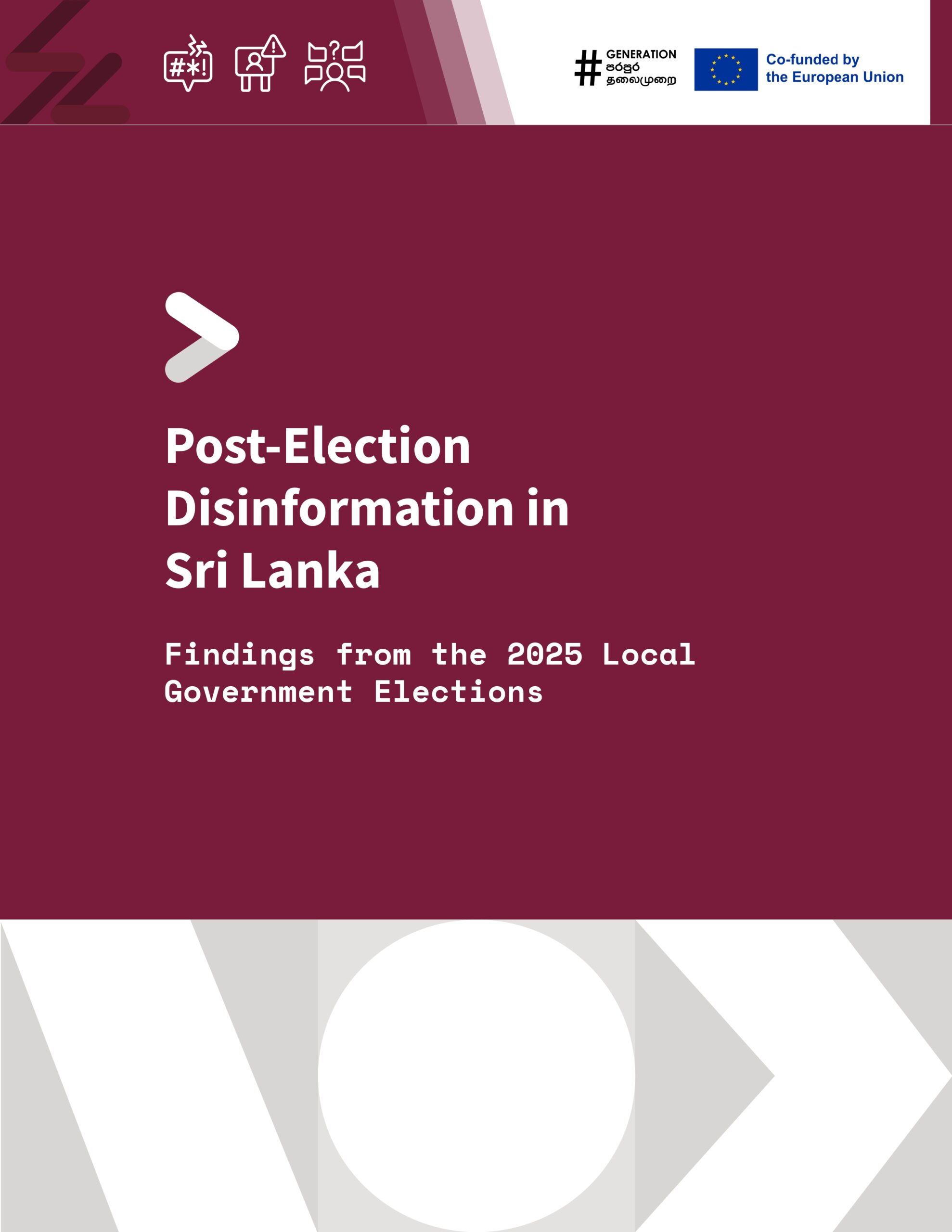
Post-Election Disinformation in Sri Lanka: Findings from the 2025 Local Government Elections
This report examines the surge of online misinformation and disinformation in the aftermath of Sri Lanka’s 2025 Local Government Elections, highlighting how false narratives and forged documents were used to undermine public trust in electoral outcomes. Focusing on key platforms and case studies, it underscores the rapid spread of unverified content and calls for stronger multilingual moderation, closer collaboration with fact-checkers, and improved digital literacy to safeguard democratic institutions.
Social Media Campaigning During the Silent Period: Analysis of Sri Lanka’s 2025 Local Government Elections
This report documents 602 instances of campaign-related social media content posted during the legally mandated silent period of Sri Lanka’s 2025 Local Government Elections, highlighting widespread violations across platforms. It analyses platform trends, geographic patterns, and party-related activity, and includes a focused case study illustrating how candidates adapted campaign messaging online during the blackout period, underscoring gaps in enforcement and the need for clearer guidance on digital election rules.
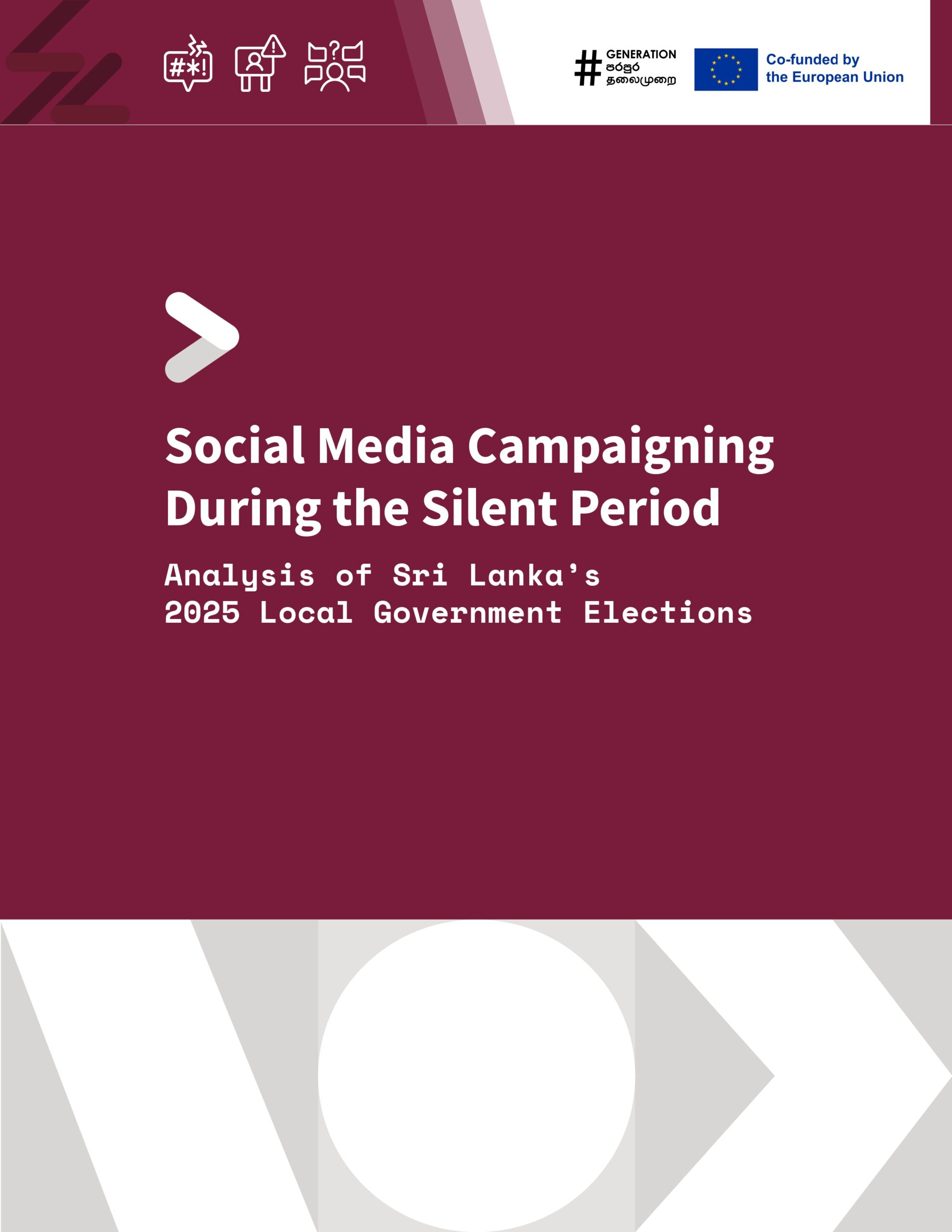
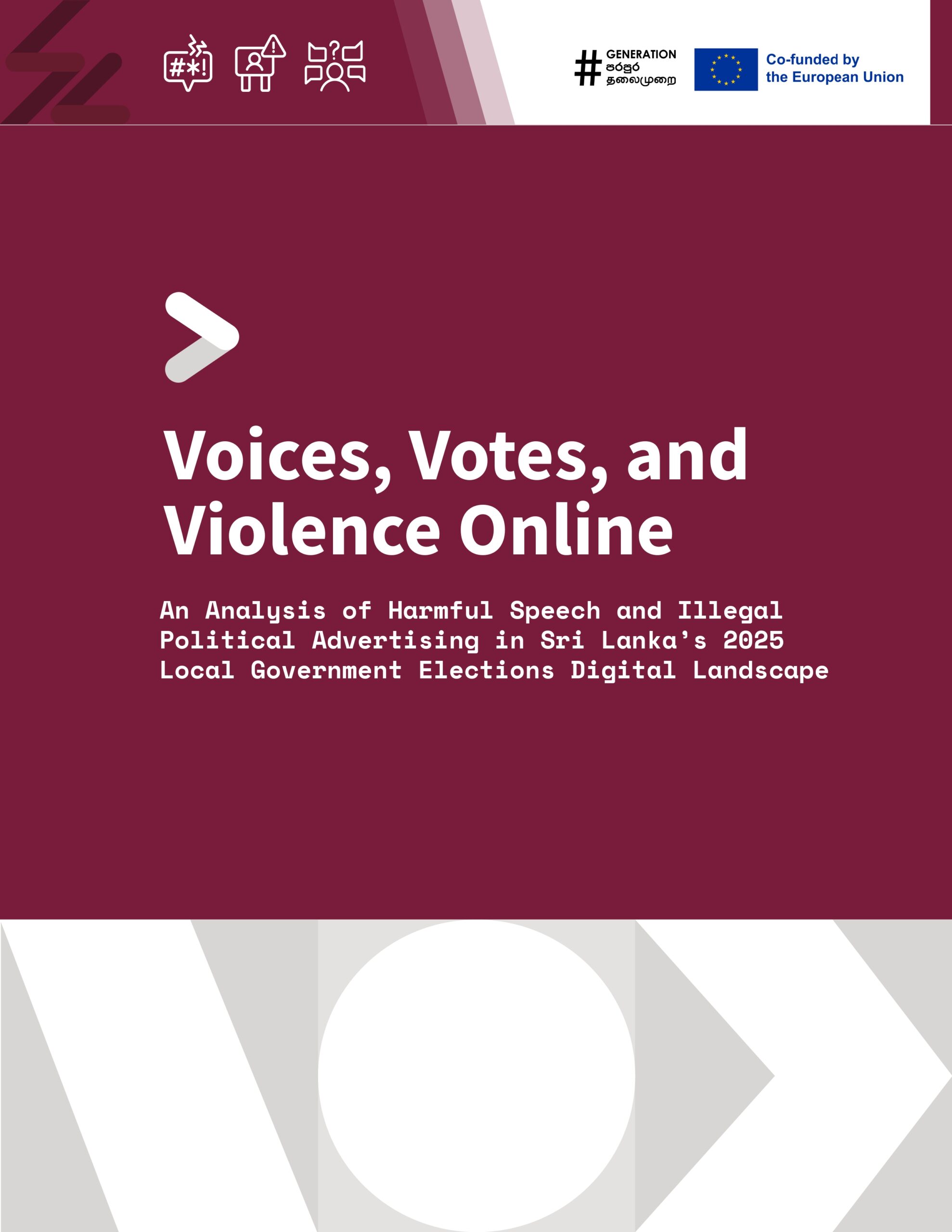
Voices, Votes, and Violence Online: An Analysis of Harmful Speech and Illegal Political Advertising in Sri Lanka’s 2025 Local Government Elections Digital Landscape
This report presents key findings from pre-election social media monitoring, examining trends in misinformation, harassment, hate speech, advocacy of violence, and illegal political advertising across major platforms. It offers insight into how harmful online content shaped Sri Lanka’s digital political landscape in the lead-up to the 2025 Local Government Elections.
Electoral Shifts & Digital Dynamics:
Sri Lanka's 2024 - 2025 National Elections in Review
This brief explores the key narratives, patterns of harmful speech, and election law violations that surfaced across Sri Lanka’s 2024–25 election cycles, as observed through Hashtag Generation’s ongoing social media monitoring efforts.
Using data compiled by our team of analysts, the report captures how online platforms were used to shape public discourse—highlighting disinformation campaigns, hate speech, and the weaponisation of identity. Featuring analysis and data visualisations, the brief was first presented at the National Dialogue on “The Digital Fourth Pillar: Social Media and the Transformation of Political Power in Sri Lanka.”

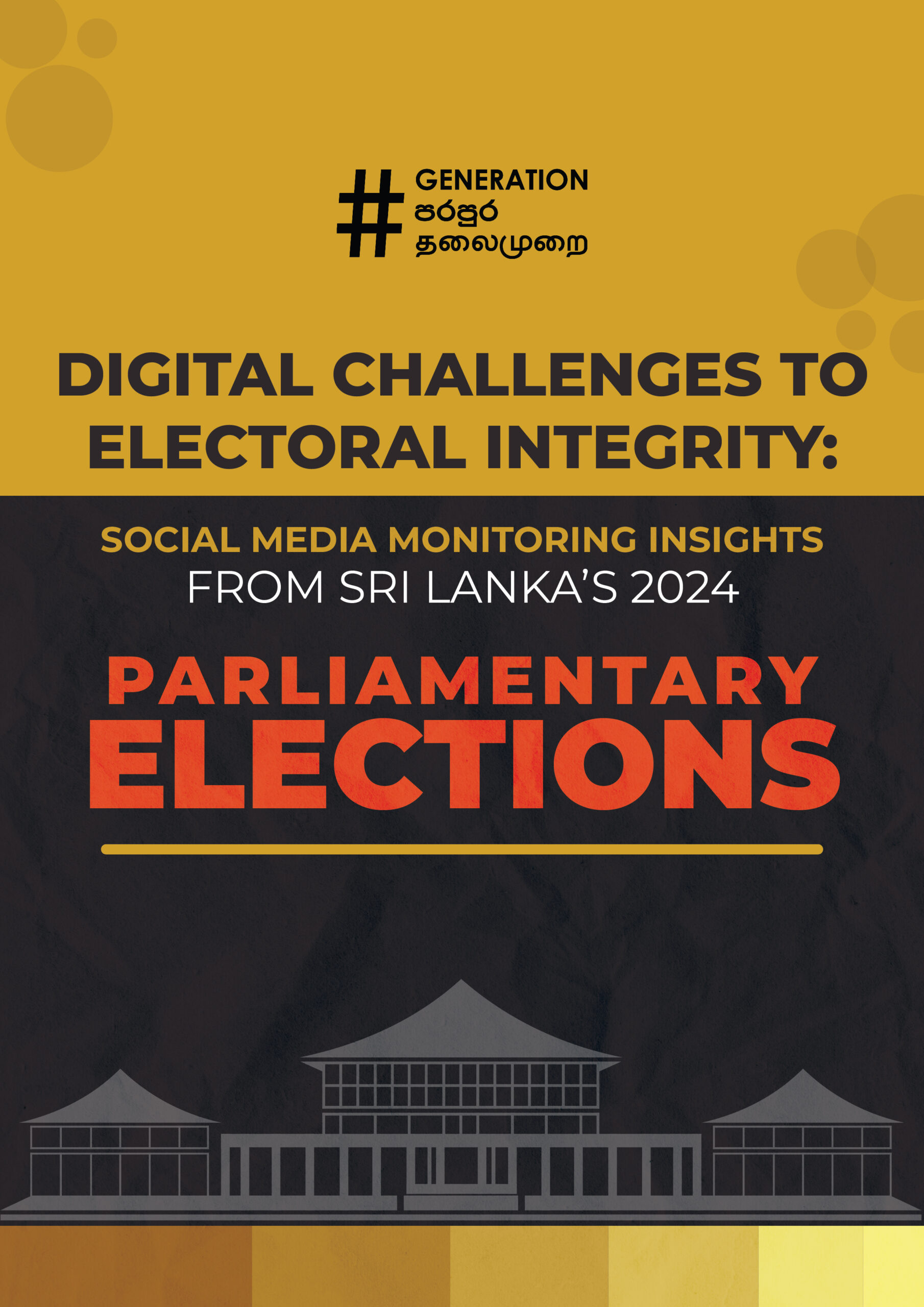
Digital Challenges to Electoral Integrity: Social Media Monitoring Insights from Sri Lanka’s 2024 Parliamentary Elections
This report offers a critical analysis of how Sri Lanka’s digital landscape shaped the 2024 Parliamentary Elections. From disinformation and hate speech to coordinated online attacks and gender-based violence, our findings highlight how social media was used to distort public discourse and undermine democratic processes.
Packed with evidence, insights, and practical recommendations, this report is essential reading for policymakers, tech platforms, civil society, and anyone invested in fair and transparent elections.
Beginner's guide to Social Media Campaigns for Social Impact
Social media isn’t just for likes—it’s a tool for transformation! Whether you’re advocating for justice, amplifying marginalized voices, or fostering dialogue, a strategic campaign can make a real difference. This beginner’s guide breaks down everything you need to know, from identifying key social issues to crafting impactful messages and engaging your audience effectively.
Learn how to navigate platforms like Facebook, Instagram, and Twitter to build awareness, inspire action, and create meaningful connections. With the right approach, your posts can spark conversations, mobilize communities, and shape public opinion.
Dive into the essentials of social media activism and discover how to turn digital engagement into lasting impact. Let’s create campaigns that don’t just inform—but inspire!


ඩිජිටල් අවකාශයේ විචාරශීලිව සැරිසරන්න
උදෑසන අවදි වූ මොහොතේ සිට රාත්රී නින්දට යන තුරු ම අපගේ ජංගම දුරකථන කෙටි පණිවුඩවල සිට ප්රවෘත්ති, වීඩියෝ, ඡායාරූප සහ හඬපට ආදී විවිධ ආකාරයෙන් විවිධ තොරතුරු අපට ලැබේ. එය තවදුරටත් වචන සහිත කෙටි පණිවිඩයක්, ඡායාරූපයක් හෝ විඩියෝ පටයකට පමණක් සීමා නොවේ. අපි අද වන විට වෙළෙඳ දැන්වීම්වල සිට වට්ස්ඇප් (WhatsApp) යනාදී පණිවුඩජාලවල හුවමාරු වන ස්ටිකර්, සමාජ මාධ්ය තුළ සංසරණය වන මීම්ස් (memes), ගිෆ්ස් (GIFs), යනා දී පුළුල් පරාසයකට නිරාවරණය වී සිටිමු.
මෙලෙස පුළුල් පරාසයක විහිදුණු තොරතුරු අතර අපට ප්රයෝජනවත් තොරතුරු මොනවාද, අපට ප්රයෝජනවත් නොවන තොරතුරු මොනවාද, අප විශ්වාස කළ යුත්තේ මොනවාද, අප බැහැර කළ යුත්තේ මොනවාද, යන්න තෝරා බේරා ගැනීම වර්තමානය වන විට එතරම් පහසු නොවේ. තොරතුරු තෝරා බේරා ගැනීමේදී අප විචක්ෂණශීලී විය යුතුය. ඒ සඳහා අවශ්ය බුද්ධිය හා චින්තන කුසලතා වර්ධනය කර ගනිමින් තොරතුරු අවකාශය තුළ සැරිසරීමට අවශ්ය හැකියාව වැඩි දියුණු කර ගැනීමට මෙම මොඩියුලය උපකාර කරගත හැකිය.
Findings from The Social Media Monitoring exercise during The 2024 Presidential Election
This report presents the key findings from Hashtag Generation’s trilingual ‘social media newsroom’ which operated during the Presidential Election 2024, the first national election since the people’s protests and the economic crisis in 2022. In partnership with the election monitoring body People’s Action for Free and Fair Elections (PAFFREL), content flagged as harmful were investigated by PAFFREL and reported to the Election Commission of Sri Lanka.
Prominent trends and narratives observed during the election period include election law violations, dis/misinformation, hate speech, incitement to violence, ethno-religious and gender-based targeting of political actors and voters. Monitoring efforts also observed several sponsored political advertisements targeting political parties and contestants.
The report also provides recommendations to the Election Commission of Sri Lanka, social media platforms, and other stakeholder groups on proactively tackling content that could negatively impact the democratic process of elections.


Toolkit for The Smart Citizen
In our daily lives, we constantly evaluate goods and services, checking details like manufacturing and expiry dates to make informed choices. Similarly, we analyze and question various factors when making decisions, sometimes delving deeper to ensure the best outcomes. Fact-checking is no different.
Today’s complex social, economic, and political landscape, largely shaped by the digital realm, overwhelms us with information, making it harder to distinguish truth from falsehood. Critical thinking and fact-checking have become essential skills to navigate this reality responsibly.
This toolkit equips individuals and organizations with practical tools to evaluate information, combat misinformation, and foster a reliable and informed digital ecosystem.
A Guide for Political Entities on Social Media
Social media is a growing space in Sri Lanka and the world. 8.2 million Sri Lankans are active on social media by February 2022 and this has been a continuously growing trend. The reports suggest that advertisers can reach up to 7.2 million people just through Facebook. Therefore, social media platforms have a strong influence on social dynamics and national politics.
The following guidelines are proposed for politicians and political parties to follow and are applicable for their usage in personal profiles, pages, political party pages as well in other forms of in-direct campaigning on social media.


Virtual Verdicts: A study on the criminalisation of online expression in Sri Lanka
In recent years, governments worldwide have begun to regulate the online sphere, often resulting in laws that unduly restrict freedoms of expression, assembly, and the right to anonymity. The Sri Lankan government joined this regional wave and introduced the Online Safety Act No. 9 of 2024 which mandated an Online Safety Commission with sweeping powers to regulate the digital space. However, the absence of specific legislation in the preceding years has not prevented the authorities from weaponizing existing laws to arbitrarily infringe on the freedom of expression in the online sphere.
This report studies the criminalisation of online expression in Sri Lanka through five thematic areas including; contempt of court, dissent and assembly, media freedom, ethno-religious conflict, and gender and sexual expression, and also discusses the Online Safety Act’s potential effects on infringing fundamental freedoms.
Hate-Speech: A Five-Point Test for Journalists
The modern newsroom is a challenging place. In the competitive world of media information flies around at breakneck speed. There is little time for checking facts and images or corroborating information and virtually no space for laid back discussions on the ethics of journalism.
The following five-point test of speech for journalism in context has been developed by EJN advisers and is based upon international standards. It highlights some questions to be asked in the gathering, preparation and dissemination of news and information that will help journalists and editors place what is said and who is saying it in an ethical context.


Propaganda, Disinformation, & the Power of Words: Media & Language Use
In the past years, the world has witnessed the global rise of propaganda and disinformation. This development poses a significant challenge both for journalists and media consumers. To counter this trend, valuable projects and publications have been launched with the aim of assisting those who would like to distribute or receive accurate information in the new media environment. Most of these initiatives, however, focus on content-related or technological issues, and generally overlook the key role that language plays in the spread of manipulative or misleading messages.
This guide for media workers highlights some of the ways in which words shape human thinking and behavior. The document offers practical skills that journalists can utilize in their daily work.
Trolls: They're not just under bridges anymore! Learn how to deal with these digital pests.
There are many trolls out there on the internet, from a Hater Troll to a Holy Cause Troll, all with their own unique characteristics. They’re not just under bridges anymore! Here is a line-up of all the prominent troll types and most importantly, how to fight them. Learn how to deal with these digital pests. This guide exposes the tricks of various online trolls.


Critical Thinking in the Digital Age
We get buried in an influx of information, from so many different sources, every day. It seems like we cannot escape news, facts and figures, gossip, memes, influencer content etc. unless we are completely isolated. We make everyday decisions based on this information.
Therefore, it is pertinent that we get accustomed to successfully differentiating credible, relevant and useful information from the rest, and using these to make better decisions for ourselves and those around us. As an organization, it is our goal to empower you with the skill of critical thinking in the constantly changing digital age. In this module, we attempt to guide you on how to do just that.
Guide for Social Media Campaigns to Combat Hate
This guide is aimed at civil society activists and organisations in Sri Lanka and any member of any community who wishes to campaign on social media platforms. The main goal of the guide is to promote inclusion, diversity, and public good by featuring the principles and techniques for a successful social media campaign.
It was produced after the workshops and bootcamps held during 2022 and 2023 as part of the Get the Trolls Out project in Sri Lanka implemented by Media Diversity Institute and Hashtag Generation, supported by the EU Delegation in Colombo.


Gender & Dissent
In recent times, hate speech on social media has become a pervasive force in influencing and informing social and political realities in Sri Lanka. During the period of anti-Government protests, social media and digital means were a powerful tool for mobilisation, dissent, as well as pushing back on this dissent.
Acute increases in hate speech and disinformation were also apparent, targeting different communities, groups, and political factions. Within these digital hotbeds, gendered hate speech, harassment, and disinformation was particularly rife. Written and visual content which aimed at objectifying, insulting, discrediting, and doxing activists and politicians who were women and members of the LGBTQI community were commonplace across Facebook, TikTok, and YouTube during the 8 month period starting January 2022.
Through The Looking Glass: Digital Safety and Internet Freedom in South and Southeast Asia


Positive Narratives Report
There is a lot of emphasis on the behaviour of harmful speech online. However, not many focus on studying the behaviour of positive narratives. This study is an analysis of behaviour of identified positive speech on social media.
Includes national and international non-governmental organisations, civil society organisations, fact-checking organisations, social movements and informal collectives working towards strengthening democracy, human rights, social cohesion and pluralism. The report is informed by a data driven approach which takes into account a number
of factors including the performance of content shared by these pages from 1 June 2020 to 31 May 2021.
Counterspeech in Sri Lanka
Almost all internet users in Sri Lanka are social media users and much of this expression and speech occurs on social media. Research by Hashtag Generation and other civil society groups indicate that this includes a prevalence and proliferation of online hate speech. Such speech is not new nor does not occur in a vacuum. Since its independence, Sri Lanka has seen the rise of various ethno-nationalist factions, often backed by governments, which used ethno-nationalism for political gain, and online hate speech is situated in this online-onground continuum of ethno-religious nationalism. And all of this is in keeping with a groundswell of racism, ethno-nationalism and intolerance in South Asia and worldwide
Hashtag Generation is a strong advocate of critical engagements in digital spaces and one approach would be to counter harmful narratives. The toolkit here is expected to guide the civil society to effectively produce counterspeech.


Social Media, the Law and Electoral Integrity: An Analysis of Existing Legal Provisions
This study examines existing election laws that apply to social media for the purpose of ensuring free and fair elections in Sri Lanka.
Desk based research and interviews with a variety of key informants, including election related stakeholders, were relied on in the compilation of this study.
Following the monitoring of social media operations that Hashtag Generation undertook during the Presidential Election of 2019 and the Parliamentary Election of 2020, Hashtag Generation observed the importance of investigating existing election laws in order to understand the ways in which they may apply to social media. This study in the first step in that investigation.
Key observations are made on the Constitutional and legal framework relating to elections and social media and collaboration between social media platforms and the Elections Commission.
Media Gender Charter for Sri Lanka (Tamil)
இந்தச் சாசனத்தின் நோக்கங்கள் பாலின சமத்துவத்தை அடைவதற்கான இலங்கையின் தேசிய மற்றும் சர்வதேச அர்ப்பணிப்புகளுக்கு ஏற்ப உள்ளன. இலங்கை அரசியலமைப்பு 12 வது பிரிவில், எந்தவொரு நபரும் பிற காரணிகளுக்கிடையில், பாலினம், மதம், மொழி மற்றும் இன அடிப்படையில் பாகுபாடு காட்டப்பட மாட்டார்கள் என்று கூறுகிறதுடன், ஒவ்வொரு நபருக்கும் ஒரு சட்டபூர்வமான தொழிலில் ஈடுபடுவதற்கான சுதந்திரத்தை உத்தரவாதம் செய்கிறது. பாலின சமத்துவம், பாதுகாப்பான பணியிட நிலைமைகள் மற்றும் பணியிடத்தில் பாகுபாடு காட்டாமை என்பவற்றுடன் தொடர்பான சர்வதேச ஒப்பந்தங்களில் இலங்கை கையொப்பமிட்டுள்ளது. ஊடக நிறுவனங்களுக்கான கட்டமைப்பு மாற்றங்கள், குறிப்பாக அரச ஊடக சீர்திருத்தங்கள் மற்றும் தகவல் அறியும் உரிமை ஆகியவை போருக்குப் பின்னரான இலங்கையின் ஊடக சீர்திருத்த பட்டியலில் அதிகமாக உள்ளன.
இருப்பினும், ஊடகங்களில் பால்நிலை சித்தரிப்பு மற்றும் பிரதிநிதித்துவம் பற்றிய விவாதங்கள் குறைந்தளவில் உள்ளன.


Media Gender Charter for Sri Lanka (Sinhala)
කැපවීම් සමග අනුකූල වේ. ශ්රී ලංකා ආණ්ඩුක්රම ව්යවස්ථාවේ 12 වගන්තිය අනුව කිසිදු පුද්ගලයකු ලිංගිකභාවය, ආගම, භාෂාව, ජාතිය සහ අනෙකුත් කාරණා මත පදනම්ව වෙනස්කොට සැලකීමට ලක් නොකළ යුතු බව ද, සෑම පුදග්ලයකුටම නීත්යානුකූල රැකියාවක යෙදීමට නිදහස ද සහතික කර තිබේ2 . ශ්රී ලංකාව රටක් ලෙස ස්ත්රී පුරුෂ සමාජ සමානාත්මතාව, සුරක්ෂිත ශ්රම තත්වයන් සහ සේවා ස්ථානයේ වෙනස්කොට නොසැලකීම් යනාදිය පිලිගනිමින් ජාත්යන්තර ගිවිසුම්වලට අත්සන් තැබූ රටකි3 . විශේෂයෙන්ම රාජ්ය මාධ්ය ආයතන ඇතුළු මාධ්ය ආයතනවල ව්යූහාත්මක ප්රතිසංස්කරණ සහ තොරතුරු දැනගැනීමේ අයිතිය පශ්චාත් යුදකාලීන මාධ්ය ප්රතිසංස්කරණ න්යායපත්රයෙහි ප්රමුඛත්වයක් ගෙන ඇත. කෙසේ වෙතත්, මාධ්යයන්හි ස්ත්රී පුරුෂ සමාජභාවී නිරූපණය හා නියෝජනය පිළිබඳ සාකච්ඡා යටපත් වී තිබේ.
Media Gender Charter for Sri Lanka
The Charter objectives are in line with Sri Lanka’s national and international commitments to achieve gender equality. The Sri Lanka Constitution states in Article 12 that no person shall be discriminated against on the basis of, among other factors, sex, religion, language, and race, and guarantees to every person the freedom to engage in a lawful occupation. Sri Lanka is a signatory to international agreements on gender equality, safe working conditions, and non-discrimination in the workplace. Structural changes to media institutions, especially for state media reforms and right to information, have been high on the post-war Sri Lanka media reforms menu. However, discussions on gender portrayal and representation in the media have been subordinated.

A Community Empowerment Journey – Addressing Violence Against Women and Girls’ (VAWG)
This booklet compiles of stories, lessons learnt, and recommendations of women and young people in rural communities, using an Active Citizen’s methodology that empowers them to bring about change in their own communities.


Sri Lanka: Social Media & Electoral Integrity. Findings from Sri Lanka's 2020 Parliamentary Election
This report provides an analysis of data collated by Hashtag Generation’s “social media newsroom” during the 2020 Sri Lankan Parliamentary Election and covers online misinformation, hate speech, harassment and election law violations that took place in the pre-election context (15th June – 2nd August), the “cooling period” (3rd – 5th August) as well as the Election day and its immediate aftermath. The report also provides some recommendations to the Election Commission, Social Media Companies, Election Observers and Civil Society Groups on countering such content that could negatively impact the democratic process of the election.
Social Media Analysis - What Facebook Tells us about Social Cohesion in Sri Lanka
This report provides an analysis of phenomena around three political events: the local government elections, anti-Muslim violence and the constitutional crisis during 2018. The study focuses on analyzing social media data from Facebook to extract evidence and generate narratives on users’ general perception and relationship with politicians as well as on misinformation and hate speech online.
To provide an analysis of how social media influences Sri Lanka’s political discourse, the report
Uses sentiment analysis and ‘criticism versus support’ analysis as a method to interpret Facebook users’ comments on politicians’ posts;
Analyses the posts of ethno-nationalist groups;
Analyses the level of engagement and whether content is misleading or not.
This analysis sheds light on the potential impact of social media usage on Sri Lanka’s social cohesion


Opinions, B*tch: Technology Based Violence Against Women in Sri Lanka
Findings from the Social Media Monitoring Exercise during the 2019 Sri Lankan Presidential Election
This report contains the key findings from the social media monitoring exercise conducted by Hashtag Generation in the run-up to, during and in the immediate aftermath of the 2019 Sri Lankan Presidential Election. We operated a social media ‘newsroom’ with trilingual capability (Sinhala, Tamil and English) which ‘observed’ social media platforms (especially Facebook), around the clock during the election period.
The findings of the monitoring exercise revealed that there were coordinated dangerous speech narratives including hate speech campaigns and dis/misinformation narratives were widely shared during the monitoring period.
Some of this content was ‘boosted’ using paid advertising on Facebook and other platforms. Such coordinated, well-planned hate speech and disinformation campaigns threaten social cohesion but creating a climate of mistrust among communities, affect healthy debate, skew public opinion and as such can affect the democratic process of an election.

